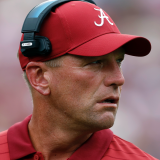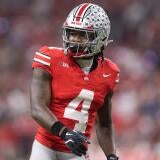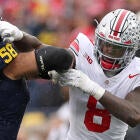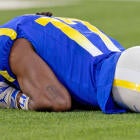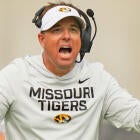College football winners and losers: A look at the best and worst of the 2016 season
From Alabama's run of dominance to Oregon's miraculous fall, here's the best and worst of the year

Just like that, it's all over.
Well, save for Army-Navy. But you get the point.
The 2016 college football regular season has come and gone. As it does every year, it went by quicker than expected. Still, this sport manages to cram a lot of highs and lows into a three-month period. From the emergence of Louisville quarterback Lamar Jackson to the rise of Colorado, there were plenty of unexpected moments.
So, we here at CBS Sports want to get you caught up on all the noteworthy things that went down -- both the good and not so good. What were the highlights from the 2016 season? What were the moments some programs want to forget? We hash out the best and worst below.
Winner -- Alabama: The machine has some miles on it now, but Alabama remains as well-oiled as ever. In fact, there's an argument that Nick Saban's program -- undefeated this year -- is more dominant than ever. That goes against the grain of what we usually see in college football. The typical timeline for a coach to win a national title is within the first three or four seasons. Saban won his first with Alabama in 2009, three years after taking the job. But whereas most coaches struggle to maintain that level of success, Saban has built upon it. If the Tide win this year's national championship, it will be the program's fifth under Saban in a decade -- one for every two years.
Loser -- SEC: The Crimson Tide have played on a different level than the rest of college football, but there's another side to this story. The fact is the SEC was down in 2016. Like, way down. SEC on CBS color commentator Gary Danielson called this the weakest SEC he's seen in 11 years. Outside of Alabama, every other SEC team has at least four losses. That's a lot of mediocrity for a conference nestled in a region of the country that produces a majority of the best athletes every year.
Winner -- Big Ten: The Big Ten champion, Penn State, didn't get into the playoff, but no conference was better positioned for inclusion heading into December. Ohio State, Penn State, Wisconsin and Michigan all had a shot, and there was at least an argument for two teams. If that's not the sign of college football's best conference in 2016, I don't know what is.
Loser -- Houston: Oh, what could have been. 2016 was supposed to be the magical year for Houston. It had a hot-name coach in Tom Herman, a talented roster and playoff-crashing aspirations. At first, the Cougars looked like a legitimate national threat with a 33-23 win over Oklahoma. However, a 46-40 loss to Navy derailed those hopes, and things went from bad to worse with losses to SMU and Memphis. (Yet sandwiched in between those was a dominating victory over Louisville. Go figure.) To top it off, Herman left to become the coach at Texas.
Winner -- Matt Rhule and Temple: How good of a coach is Rhule? The now-former Temple coach followed up a breakout season in 2015 in which the Owls won 10 games with another 10-win season this year. Plus, Rhule took this team a step further by winning the American Athletic Conference -- and with style, too, by beating Navy 34-10. Between the two 10-win seasons, this was easily his better coaching job. He did so well, in fact, that he left Temple for Baylor on Tuesday.
A Military Bowl vs. Wake Forest is still winnable, too, meaning Rhule's now-former program could wind up with 11 wins! Remember: It wasn't terribly long ago that the Owls were being kicked out of the old Big East for basically stinking up the joint. Al Golden deserves a ton of credit for resurrecting the program, but Rhule took it new heights. Now, Temple looks for his replacement.
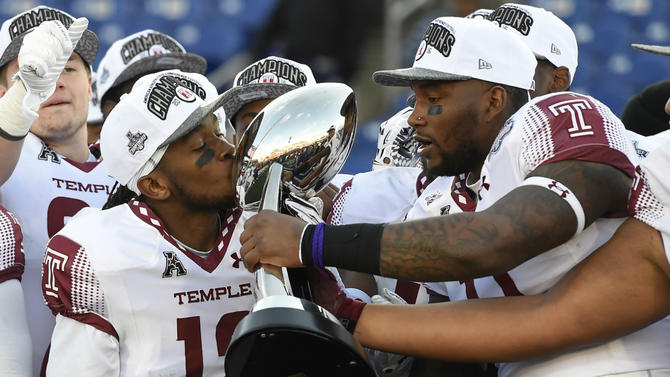
Loser -- Notre Dame: The team's fall to 4-8 -- its first losing season since 2007 -- wasn't of the garden variety; it was spectacular in fashion. From losing an overtime thriller against Texas to blowing a lead to Virginia Tech, the Irish managed to come up short in just about every imaginable way. Defensive coordinator Brian VanGorder was fired in the middle of the season and an academic misconduct story led to vacated wins from the 2012 and 2013 seasons. Coach Brian Kelly will be back in 2017, but likely on a much warmer seat than the one he sat upon to start the 2016 season.
Winner -- Colorado: Enough can't be said about the job coach Mike MacIntyre has done in Boulder. The Buffaloes program, once proud, was dead in the water when he arrived four seasons ago -- and it had been lying there a while, too. After winning 10 games in his first three years, MacIntyre led Colorado to a 10-3 effort and won the Pac-12 South. Rightly, MacIntyre was named the Walter Camp Coach of the Year.
Loser -- Conference championships: Playoff bids were on the line in last week's conference championship games, thus their importance was palpable. But, boy, most of the applicable conference title games were a dud. Alabama crushed Florida and Washington piled it on against Colorado. Even the de facto Big 12 title game The ACC championship between Clemson and Virginia Tech was exciting, as was the Big Ten title game between Penn State and Wisconsin, but the latter didn't get the Nittany Lions into the playoff -- and that probably was never going to happen. Not every conference championship was bad, but it didn't turn out to be as eventful as it could have been.
Winner -- Penn State coach James Franklin: Whether Penn State should have been among the final four teams is a separate conversation that doesn't serve much of a purpose anymore. Let's take a minute, then, and recognize that Franklin's team emerged as the representative from a division featuring Jim Harbaugh, Urban Meyer and Mark Dantonio. If you had told me that was the case three months ago, I'd have called you crazy. And hey, a Rose Bowl berth isn't a bad consolation prize for the Big Ten champs. There have been questions about Franklin's ability to win big games against top opponents, but beating top-10 teams Ohio State and Wisconsin with the potential of USC isn't too bad of an answer.
Loser -- Ex-Texas coach Charlie Strong: There's not much more that can be said about Strong's three years at Texas that hasn't already been said, so I'll end with this: This was a terribly mismatched gig for both sides, for multiple reasons that would take too long to list. Would he have turned it around in Year 4? Perhaps, but there simply weren't enough signs that was going to happen. Strong is a good coach who should (and will) get another chance elsewhere. Texas got its guy in Tom Herman. In the end, this was the right move for all parties.
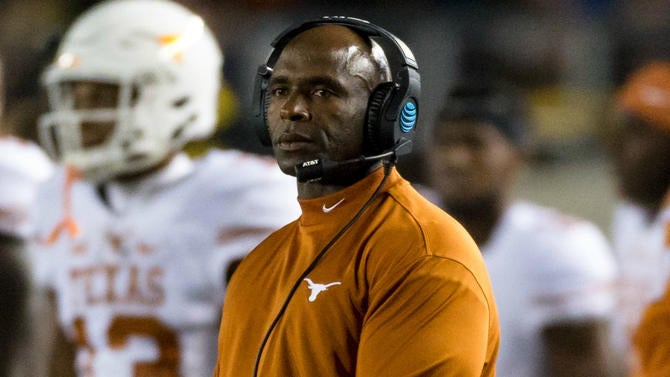
Winner -- Washington: It happens every year. There's one sexy offseason darkhorse everyone wants to get behind. However, that darkhorse selection doesn't always pan out. Washington was the team du jour of 2016, except the Huskies actually achieved the lofty goals set for them, and then some. Third-year coach Chris Petersen led this program to a Pac-12 championship and College Football Playoff appearance. Nothing ever happens in a vacuum, of course; Oregon's sharp decline and Stanford's rebuilding season helped pave the way for this run, but Petersen is an elite coach who has his program in position to win for a long time.
Loser -- Ex-Oregon coach Mark Helfrich: Things went bad for Helfrich and Oregon -- and in a hurry. Oregon canned Helfrich following a 4-8 season. Just two years ago, the Ducks were playing for a national championship with a Heisman-winning quarterback. However, a drop-off in recruiting, specifically at quarterback, was the death knell for Helfrich. Now, the program has to conduct a coaching search for the first time in 40 years.
Winner -- Western Michigan: Row that boat, baby. Row it straight to Arlington for the Cotton Bowl. Western Michigan finished as one of two undefeated teams at the end of the regular season. The Broncos' 13-0 record is the best in school history and represents the first MAC champion to enter bowl season unbeaten since Marshall in 1999. It's been a surprisingly quiet coaching market, so P.J. Fleck may just stick around a little bit longer.
WMU's P.J. Fleck on job rumors. "If you don't live in the moment, you're going to be miserable, and I don't want to be miserable tonight."
— Tony Paul (@TonyPaul1984) December 3, 2016
Loser -- Baylor: There's only one place to start with Baylor, and that's the sexual assault scandal that rocked the university. Absolutely nothing -- not the firing of coach Art Briles, not the six-game slide by the football team to end the season, not the recruiting fallout -- comes close to matching the importance of that story. That will always be the case. But goodness, what a fall from grace by the Bears. From the coaching staff's social media revolt to the bizarre story of an associate athletic director allegedly grabbing a media member by the throat after the TCU game, things have come unraveled quickly. The laissez faire attitude of acting coach Jim Grobe, the sudden spring of #CAB shirts as well an appearance by Briles himself at an away game haven't helped matters.
Winner -- Idaho: The program announced this year it's dropping from the Football Bowl Subdivision to the Football Championship Subdivision. It's a complete reverse of what many programs have been doing, jumping from the FCS to the FBS in hopes of finding some sort of media rights pot of gold at the end of a rainbow. So let's hear it for the Vandals, who went 8-4 this year in the Sun Belt. According to CBS Sports' own Dennis Dodd, that's the best record for the program in nearly two decades. This is unimportant to many people, and that's fine, but Idaho is a program facing a harsh reality of trying to compete in major college football. So good for them.
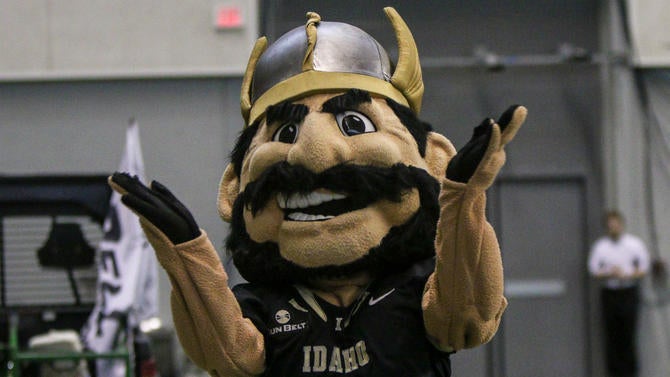
Loser -- Tennessee: The "Championship of Life" joke is overplayed, so we'll skip it altogether. Besides, Tennessee fans probably aren't laughing at the way the 2016 season played out. The Vols, picked in the preseason to win the SEC East and finally take that ever-elusive next step forward, went 8-4 and failed to claim the division. Tennessee did finally beat Florida, but it lost three in a row during its midseason stretch, including a bad loss to South Carolina. The season-ending loss to Vanderbilt is probably what bumped the Vols from the Sugar Bowl to the Music City Bowl. Tennessee's injury report is lengthy, and that needs to be taken into consideration, but it's an excuse for only so long. Coach Butch Jones has not worked his tail off recruiting over the past few seasons to keep coming up short.
Winner -- John Carroll (again): You're darn right I'm dipping back down into the Division III ranks. As you may (or may not) recall earlier this year, John Carroll upset Mount Union 31-28. As far as lower level football is concerned, that's like beating Alabama. Well, John Carroll did it again in the DIII playoffs by upending Wisconsin-Whitewater 31-14. Again. that's like beating Ohio State. What I'm saying is John Carroll actually wants Bama.
Loser -- Heisman Trophy race: Chances are that Louisville quarterback Lamar Jackson is going to win the Heisman. He's more than earned it. You don't tally up nearly 5,000 yards of offense and 51 touchdowns for no reason. Still, Jackson is probably going to back himself into winning the award after the Cardinals lost consecutive games to Houston and Kentucky to finish out the season. Some Heisman voters turned in their ballots early and there's no clear-cut No. 2 option who could have swept in late in the season to pick up extra votes. Jackson was a dynamic and exciting player, but this Heisman race was mundane for a variety of reasons.
Winner -- USC quarterback Sam Darnold: USC looked cooked after losing to Alabama and Stanford, and the heat was already on coach Clay Helton's seat. However, the switch at quarterback from Max Browne to Darnold has paid off. Darnold didn't win in his first start against Utah, but the Trojans haven't lost since. USC's offense is explosive again and Darnold's mobility adds an extra dimension that USC hasn't seen before. Helton's quarterback change is but one part in this team's turnaround, but it is a big part all the same.
Loser -- Virginia coach Bronco Mendenhall: Every year, there's a coaching change that makes you go "Huh?" Mendenhall's departure from BYU to Virginia was that change a year ago. And did it ever fall on its face. The Cavaliers went 2-10 in Mendenhall's first season and never stood a chance. (Meanwhile, BYU went 8-4.) Granted, Mendenhall didn't inherit a particularly good situation, but this surprising coaching move didn't yield any results in Year 1.
Winner -- Defensive touchdowns: If there was ever a year for a defensive player to make a Heisman run, this would have been it. From three pick-sixes by Ohio State safety Malik Hooker to Alabama's defense scoring a majority of the Tide's 14 non-offensive touchdowns (two fumble returns by defensive end Jonathan Allen), this was an exceptional season for defenders scoring immediate points off turnovers at eye-popping rates.
Loser -- BYU quarterback Taysom Hill: Life isn't fair, and Hill is a prime football example of that. The senior sustained a season-ending (and thus career-ending) elbow injury against Utah State. It was the fourth time in five years his season was cut short by injury. When he was healthy, Hill was a fun quarterback who played fearlessly. Ultimately, that proved to be what kept him back from a more complete college career.
Loser -- All of us (Goodbye, Saturdays with Uncle Verne): No, this isn't here because we're CBS Sports. Honest. I am going to greatly miss listening to Verne Lundquist call the SEC on CBS broadcast every Saturday next fall. Uncle Verne became the voice of SEC football and "Oh my gracious!" should be as much apart of Southern vernacular now as "y'all." Brad Nessler will do a fine job and the broadcast will be every bit as good -- it'll just be a very different without Verne in the booth.
Verne says he's going to miss the SEC. But really, we're all going to miss him on the SEC on CBS. #ThankYouVernepic.twitter.com/pM2Rxke5aV
— SEConCBS (@SEConCBS) December 4, 2016



